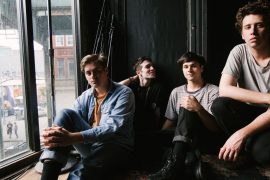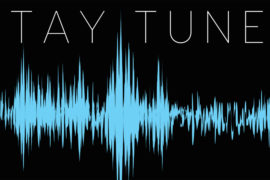Fort Wayne native PJ Sauerteig is the mastermind behind Slow Dakota, an academic performance-based music project. Beyond being a Columbia graduate, pursuing a law degree at NYU, and being a Pushcart nominee, Sauerteig has also released three albums. Did we also mention that he’s all of 24? PATTERN had the opportunity to chat with the Hoosier musician over brunch to learn more about his upbringing, niche genre, and themes behind his latest release, The Ascension of Slow Dakota.
Aubrey Smith: You’ve participated in a couple of different music projects. What did Slow Dakota provide that others maybe didn’t?
PJ Sauerteig: Complete control. I was in a band before Slow Dakota, and it was really fun. But I lost control of the songwriting process. As more people became involved, the control freak side of me took over. I like having the control of the project from every level — album cover design, recording everything, writing everything. I want to be able to bring in people from outside only when I need them. I’ll have my sister or people that I don’t know that well come in and play for an afternoon. That probably reflects poorly on my ability to work well with others. I initially started off with more control in the band, but I gradually realized that when you’re working with people at an equal capacity to you, you have to defer to their ideas and you don’t have veto power. It’s a democratic process, and other people can overrule you. But, at the end of the day, if I’m going to spend the time writing and working on recording… all the late nights I want complete power over that. I know that sounds really autocratic, but that’s the truth. Some people love working with other people and are okay with compromising. I guess that’s just not me.
AS: How odd was it to find appreciation for a completely new field than the one you intended on studying? I know you said you never wanted to be a poet.
PS: A lot of the kids that were in my poetry class continued onto MFAs and wanted to be writers or poets. Some of them are in grad school for that, which is awesome, and they are all super talented. I never felt comfortable in the role of a writer or a poet. I was always drawn more to music because for me, you can be a writer and a musician at the same time. So why not combine all the things that you love? I don’t think it was common to pursue poetry as a means to an end in the way that I tried to be a better lyricist. I really enjoyed it, and I continue to love poetry. Some of the people on the album are poets, and it’s a world that I still feel really close to.
AS: Is there anyone out there you would consider your competition?
PS: Joanna Newsom, but I don’t actually feel like I’m worthy to be in competition with her. Her music is very niche and lyrically unfathomably sophisticated. She’s really well-read and amazing. She’s a huge influence on me. There’s no way I could field myself to be in competition with her. That would be like me being in competition with Lebron James. It’s impossible to think of it that way.
AS: What compelled you to pursue such a niche genre?
PS: I’m aware that my music is extremely weird and eccentric and that it requires a lot from the listener. I would not feel comfortable dragging a bunch of other people into that with me knowing how weird it is and how few people it will attract. I would never impose that upon people. So that’s why I had to do it by myself because I know it’s fucking weird.
Concept albums… like “Hospice” by The Antlers is an inspiration because it’s one coherent linear story inside of an album which is a weird thing to do. He did that really well, in a way that I look up to a lot and could never hope to imitate.
AS: You’re very down-to-earth and pragmatic about your reach and audience.
PS: Yeah. Even if a relative is like, ‘oh I heard your music, and I really like it,’ it seems disingenuous. I really truly expect nothing and expect that no one will like it. So if anyone likes it, it blows me away.
AS: So it’s self gratification. That means you love it.
PS: Not expecting any money or gain from it opens up certain doors that feel like a luxury. Art that’s made purely for its own sake opens you up to a freedom that you’re lucky to have.
AS: There are no bounds.
PS: You don’t have to make it more radio-listenable to pay the rent this month. I’m very lucky not to have to worry about that.
AS: What about the Fort Wayne music scene? It’s like a hidden Hoosier goldmine.
PS: It is, yeah. I was at a house party this summer. My friend who is a music guy invited all of his friends, which are all the Fort Wayne bands. The entire scene was in one house taking turns playing music for each other. It was so insane and so beautiful that everyone knows each other. It’s this tiny little cross-pollinated world that has a lot a talent in there. I regret that I’m not a part of it because I live elsewhere. But when I’m home, I try to go to the shows.
AS: Do you know anything about the Indianapolis music scene?
PS: Some great bands have come out of here. I really like Margot and the Nuclear So and Sos. They are great. I’ve come here for a lot of shows. The Murat Theater is good. I think Hale’s Corner is living here – one of my favorite bands. Fort Wayne is more indie rock-based than hip-hop, but that’s so cool that you have a scene here.
AS: You’re no stranger to having some dark moments in your life. How were you able to face them to produce beautifully crafted lyrics about suicide?
PS: Suicide is a funny theme. The more you look for it, the more you notice it everywhere. A lot of the great poets seems like at some point all of them have had to reckon with suicide. Which is really weird because we think of it as such a niche idea or hush hush in someone’s darkest days. Artistically, though, it’s a really important theme. Even the happy poets — you even get a whisper of it in Whitman, which is odd because he’s so happy all the time. He’s just walking around having sex with everyone and petting cows and stuff, but he’s no stranger to it.
AS: In some of your songs, you have such an upbeat undertone behind the idea.
PS: Distance is vital. I try to give myself ample time between feeling something and then finishing a song about it. The sad-boy songs I write at my lowest lows are always terrible. A great professor once told me that poetry isn’t a journal, or a memoir. If you just bleed all over the page and press print, it’ll never be any good. For example, the British poet, Alfred Lord Tennyson, wrote a great eulogy for a college friend who had died suddenly. Instead of writing the whole thing in a sob storm the night-of, he didn’t finish the poem for 15 years (!) after his friend’s death. That’s what I mean by distance. Give yourself time to master your grief, make friends with it, get to know it, and then put it on the page.

AS: What’s in store for Slow Dakota? Do you ever see yourself touring?
PS: I don’t really play live as much as I know I should. I know that it’s important to exposure. If you want to make any money, meet new people, or bring your music to music places. I don’t feel comfortable playing live because I’m not very good at it. I have hard time recreating a lot of the songs live. The Lilac Bush, for example, I don’t even know how I could get a horn section, an organ, flautists, and mic all of them… I wouldn’t even know where to start making that happen for a live setting so I usually don’t. I truly don’t have the expertise to do that. Whenever I do play live, I always hate myself after. I’m kind of hard on myself.
I’ve been doing some watercolor illustrations of the albums. Once I illustrate all of the songs from the albums, I would like to publish it together in a book of collected illustrations and lyrics. I think lyrics — it’s one thing to hear them, but on the page, they look very different. It would be amazing to have them read the same way you would read poetry. They take on a different life on the page when you see them typed out. I think probably putting that book out would be cool.
I’ve learned to take my time. I used to try to record albums in three months. You just can’t do it. I would have a song, and it would just sit on my computer for eight months. One night, I would just be at the piano, and I would be like, ‘that’s it! That’s what it needed.’ It’s like a puzzle. So I’m tentative to do anything quickly, which is maybe in part because I’m from the Midwest.
AS: Any advice for up and coming musicians trying to get their voices heard outside of Indiana?
PS: Oh man. I’m in no position to give advice. I guess – study. People forget that making music is inherently an academic exercise in a sense that all important musicians could teach Ph.D. level courses on music and history appreciation. Kanye West — the amount of music that he knows, understands, and is fluent to talk about is unbelievable. If you want to be a musician but don’t study music critically, study and internalize huge amounts of music, then you have no hope of doing it. Just the way that if you wanted to be a sculptor and you never studied other sculptures. If you wanted to be an author and didn’t know a shit-ton about writing and other authors. It’s all academic. Part of the point of my music is that it is blatantly academic and knowingly pretentious at times. But it is with the intention of signaling that if you are going to make music, you are inherently an academic. You should be able to teach. You should be able to be fluent in all of these different styles. With a winking eye, that’s kind of what I’m doing. The music is very knowingly elitist with all of the poetry and references, but it’s really pointing to that idea.
Follow Sauerteig on Instagram and Twitter.
Photos by Polina Osherov




